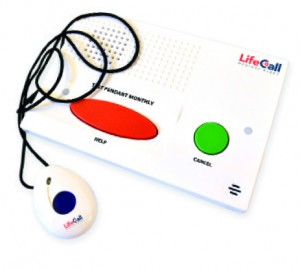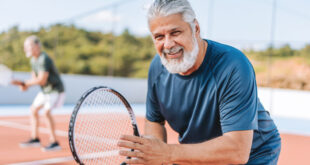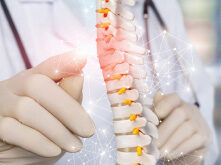Sherwood David Graham
 The National Council on Aging reports that falls are the number one reason why seniors lose their independence – because they are the leading cause of injury and even death among older adults. This year one in three adults age 65 and older will fall, and two-thirds of those will experience another fall in the following six months.
The National Council on Aging reports that falls are the number one reason why seniors lose their independence – because they are the leading cause of injury and even death among older adults. This year one in three adults age 65 and older will fall, and two-thirds of those will experience another fall in the following six months.
If you are like Virginia, an active woman in her 80s, you enjoy your independence and prefer to live in your own home. Virginia lives alone and is able to take care of most of her personal needs, takes walks daily and enjoys spending time with her friends and family. However, she is less steady on her feet than she used to be – at risk for falls, and needing the security of being able to summon help if she can’t reach her phone.
She made the decision to get a LifeCallTM FallAlert® medical alert system. Virginia says, “During the years that I have worn the LifeCall button, I have had only two occasions to use it. The second call saved my life. On March 18 I fell and struck my head. I bled profusely.” With one press of a button on her LifeCall pendant, the LifeCall emergency response center contacted paramedics and, according to Virginia, “they were by my side within minutes. They took me to the Trauma Center in Delray Beach where I lost consciousness.”
The Fear of Falling
For seniors like Virginia, who have a history, a fear, or are at risk of falling, LifeCall Medical Alert Systems with FallAlert can be an ideal solution – especially if one’s medical history includes a stroke, heart attack, dizziness/lightheadedness or issues with coordination. Featuring the latest and most innovative technology available in the industry, the FallAlert detection sensors can detect a fall as it occurs and automatically signal the base monitoring unit for assistance.
LifeCall®…If you do fall
LifeCall in-home health care monitoring solutions give you the ability to summon prompt assistance right at your fingertips. In the event of a fall you can get help quickly, which reduces medical complications that result from being immobile for prolonged periods of time. LifeCall will get you help in two ways.
The LifeCall Response Center is the only center where all operators are Certified Emergency Medical Technicians. It is powered by a world-class automation platform and two fail-safe redundant systems. The center also has been recognized by Computer World Magazine for its high-tech infrastructure provides fast access to highly trained, caring Response Associates at the push of a button, 24 hours a day, 365 days a year.
FallAlertTM…When you can’t call
LifeCall’s FallAlert provides additional protection by automatically placing a call for help if a fall is detected and you can’t push your button because you are disoriented, immobilized, or unconscious. This enhanced service option can provide even greater security and peace of mind.
The FallAlert system features sensors that detect between normal activity and an actual fall.* By continuously measuring motion, movement and speed in all directions, the fall detector compares what it senses to what it considers an actual fall. If the FallAlert system detects a fall, and if there is no movement or tilt from horizontal to vertical positioning detected after 10 seconds, an unconsciousness alarm will be transmitted to the base monitoring unit, signaling for emergency assistance. The LifeCall emergency Response Center will establish two-way communication promptly and, if there is still no response, they will proceed to follow the pre-designated emergency protocol.
FallAlert can provide you with a comprehensive way of managing your risk of falling 24 hours a day and the peace of mind that comes from knowing that if you are unable to respond to an emergency you can still receive help. While automatic fall detection can detect more than 95% of falls, some movements may not be detected. In the event of a fall, if you are able, you should always press the button on the Medical Alert pendant to get help.
After doing her research, Virginia made the decision to call LifeCall and acquire a FallAlert medical alert system. “I wear that little life-saving button all the time. Any elderly woman who lives alone should certainly have one.”
For information about the life saving services offered by LifeCall® call (866) 220-1212 today. It could be the most important call you’ll ever make.
*FallAlertTM works through sensors that detect a person’s sway, orientation and impact with surface. It does not detect 100% of falls. If you are able after a fall, you should always press the LifeCall® button when you need help.
For 40 years LIFECALL® Medical Alert Systems have provided families with security and independence at their fingertips by offering instant access to EMT-trained emergency personnel around the clock at the push of a button. Falls and strokes are common among seniors – a personal emergency response system can save your life. LIFECALL®: the most important call you’ll ever make.
By taking a few modest steps, many falls can be prevented.
1. Make your home safer
About half of all falls happen at home. To make your home safer:
• Reduce tripping hazards – keep cords, papers, books, boxes, plants, shoes and clothes off of the stairs or away from places you walk.
• Either remove throw rugs or use non-skid mats or double-sided tape to keep the rugs from slipping.
• Use non-slip mats or appliques on the shower floor or in the bathtub.
• Install grab bars in the shower or tub and next to the toilet.
• Install handrails and lights on both sides of staircases.
• Improve the lighting in your home. As you age you need brighter lights to see better. To reduce glare, hang light-weight curtains or shades
• Keep the items you use most often in cabinets you can reach easily without using a stool or stepladder
• Wear shoes both inside and outside the house. Avoid going barefoot or wearing slippers.
2. Have your vision checked
Once a year have your eyes checked by your eye doctor. You may have developed cataracts or glaucoma or your glasses prescription may have changed. Poor vision increases your chances of falling.
3. Have your doctor review your medicines
Once a year you should have your doctor or pharmacist review the prescriptions and medicines you take, even over–the–counter medicines. As you age, the way medicines affect your body can change. In addition, some medicines, or combinations of medicines, can cause dizziness or drowsiness and cause you to fall.
4. Begin a regular exercise program
Finally, exercise is perhaps the most important thing you can do to lower your risk of falling. Exercise improves your balance and coordination, makes you stronger and helps you feel better. A lack of exercise leads to muscle weakness and an increased propensity for falls. Ask your doctor or health care provider what type of exercise program might be best for you.
Compression pump directly to home – limp swelling poor circulation – open wound lymphedemia, venous insufficiency – acutewoundcare.com
To learn more about LifeCall’s wide array of medical alert systems, visit www.lifecall.com or call a LifeCall security representative today at 1-866-220-1212
800 Village Square Crossing
Palm Beach Gardens, FL 33410
It could be the most important call you’ll ever make.
Check Also
Breaking Through the Pain: How the Stealth Laser is Revolutionizing Nerve Pain Treatment
Nerve pain, or neuropathic pain, is one of the most challenging conditions to treat in …
 South Florida Health and Wellness Magazine Health and Wellness Articles
South Florida Health and Wellness Magazine Health and Wellness Articles




